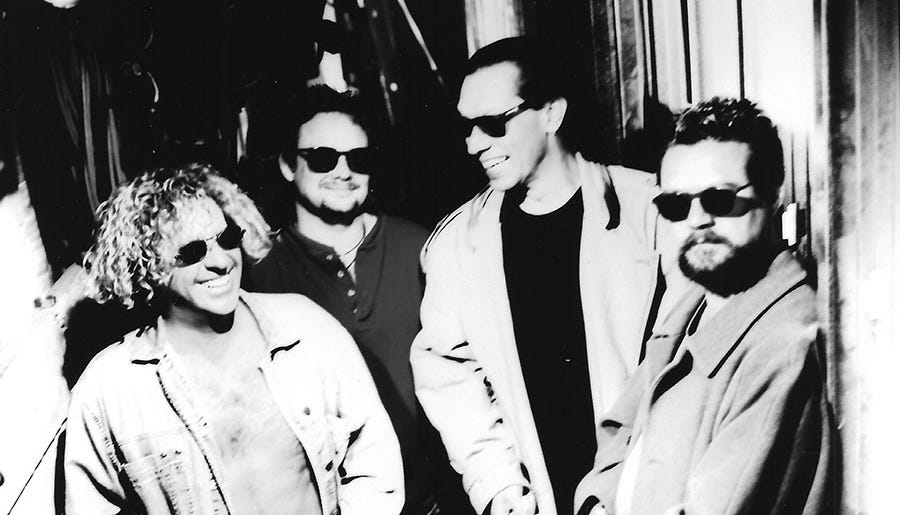The 1990s were a turbulent time for rock royalty. The slick arena rock that dominated the 1980s was suddenly out of fashion, eclipsed by grunge’s stripped-down, angst-driven sound. Bands like Van Halen, who had once ruled the airwaves with oversized riffs and bigger personalities, found themselves at a crossroads.
For Van Halen, the decade became a proving ground. Their output in the ‘90s was marked by reinvention, creative tension, and a struggle to stay relevant without sacrificing their identity. What emerged from this period is a fascinating chapter in their legacy — one filled with triumphs, missteps, and one ill-fated Crystal Pepsi ad.
1991: A Storm Brewing
Van Halen kicked off the decade with For Unlawful Carnal Knowledge (1991), an album that arrived just as the musical landscape was shifting. While bands like Nirvana and Pearl Jam were preparing to unleash the grunge revolution, Van Halen doubled down on their classic rock foundation. The album’s lead single, “Poundcake,” featured Eddie Van Halen wielding a power drill as an instrument, a bold move that symbolized the band’s refusal to bow to the changing times.
Musically, the album marked a return to a more muscular sound, thanks to producer Andy Johns. Gone were the prominent keyboards of OU812 (1988), replaced by thick guitar tones and Zeppelin-esque production. Fans and critics alike noticed the shift. Van Halen sounded heavier, more serious — but was the world still interested?
“Right Now”: The Song That Defined an Era
Of all the singles released during Van Halen’s ’90s run, none resonated quite like “Right Now.” With its iconic piano riff and socially conscious video, the song became a cultural touchstone, winning several MTV Video Music Awards and capturing the spirit of the early ‘90s.
The video tackled weighty issues: corporate greed, environmental destruction, political apathy. One provocative line even read, “Right now, God is killing moms and dogs because he has to.” For a band once known for party anthems, this was a bold — and unexpected — statement.
But “Right Now” also became inescapably linked to its use in a Crystal Pepsi ad campaign. While some fans appreciated the mainstream exposure, others felt it cheapened the song’s message. Still, there’s no denying its impact. Even today, it stands out as one of Van Halen’s most culturally significant tracks.
Sammy Hagar’s Departure: The Beginning of the End?
As the decade wore on, tensions between the Van Halen brothers and frontman Sammy Hagar began to simmer. By 1995’s Balance, the cracks were starting to show. The album leaned into darker themes and heavier sounds, but behind the scenes, creative differences and personal friction were threatening to unravel the band.
Hagar’s departure in 1996 marked the end of an era. The split was acrimonious, and the fallout left fans divided. Some remained loyal to Hagar, while others sided with the Van Halen brothers. What was clear, however, was that the band was about to embark on a risky new chapter.
Enter Gary Cherone: A Bold (but Brief) Experiment
With Hagar gone, Van Halen recruited Extreme frontman Gary Cherone for Van Halen III (1998). It was a bold move — and a polarizing one. The album, with its more experimental sound, failed to resonate with fans and critics alike. Cherone, a talented vocalist, struggled to fill the shoes of both Hagar and original frontman David Lee Roth.
Despite its commercial failure, Van Halen III isn’t without merit. Songs like “Fire in the Hole” showcased Eddie Van Halen’s continued brilliance as a guitarist. But the album’s lack of cohesion and absence of a standout single made it a hard sell for fans craving the classic Van Halen sound.
Cherone’s tenure with the band was short-lived. By 1999, he was out, and the future of Van Halen was uncertain.
Staying True (for Better or Worse)
One of the most fascinating aspects of Van Halen’s ‘90s journey is how they resisted the trends of the time. While many of their contemporaries flirted with grunge or alternative influences, Van Halen remained steadfast in their identity. They didn’t try to be something they weren’t.
That stubbornness was both a blessing and a curse. On one hand, it meant they stayed true to their roots. On the other, it left them somewhat out of step with the evolving music scene. By the end of the decade, Van Halen’s relevance was in question.
Legacy Check: Van Halen in the ‘90s
Looking back, Van Halen’s ‘90s output is a mixed bag. For Unlawful Carnal Knowledge remains a fan favorite for its hard-hitting riffs and refusal to bow to grunge. Balance hints at the band’s internal struggles while delivering some of their darkest material. And Van Halen III — often derided as a misstep — deserves a second listen, if only to appreciate Eddie’s relentless drive to push boundaries.
The decade may not have been their glory days, but it was a crucial chapter in the Van Halen saga — one filled with reinvention, risk, and resilience. To truly grasp the band’s wild ride through the 1990s, join rock historians and music journalists Greg Renoff (Van Halen Rising), Matt Wardlaw (Ultimate Classic Rock), Eric Grubbs (Post), and Chip Midnight (Kids Interview Bands) as they break down every twist and turn in the story. From the power drill riff of “Poundcake” to the misunderstood legacy of Van Halen III, they pull no punches in exploring the highs, lows, and untold tales of this pivotal era.
Songs in this Episode:
Intro - Man on a Mission
11:34 - Judgement Day
47:55 - Take Me Back (Deja Vu)
1:06:50 - Me Wise Magic
1:17:05 - Without You
Outro - Can’t Stop Loving You


















Share this post